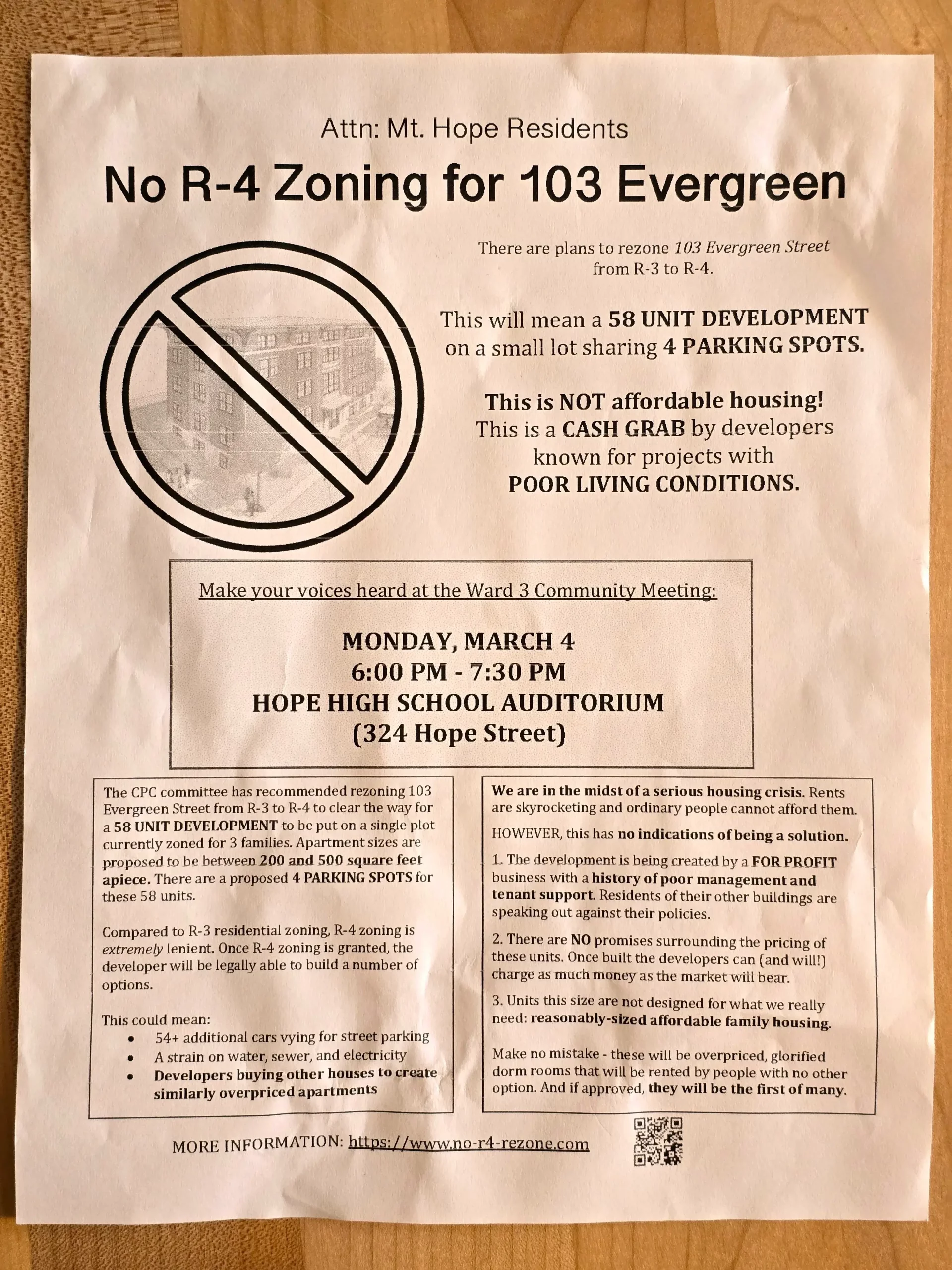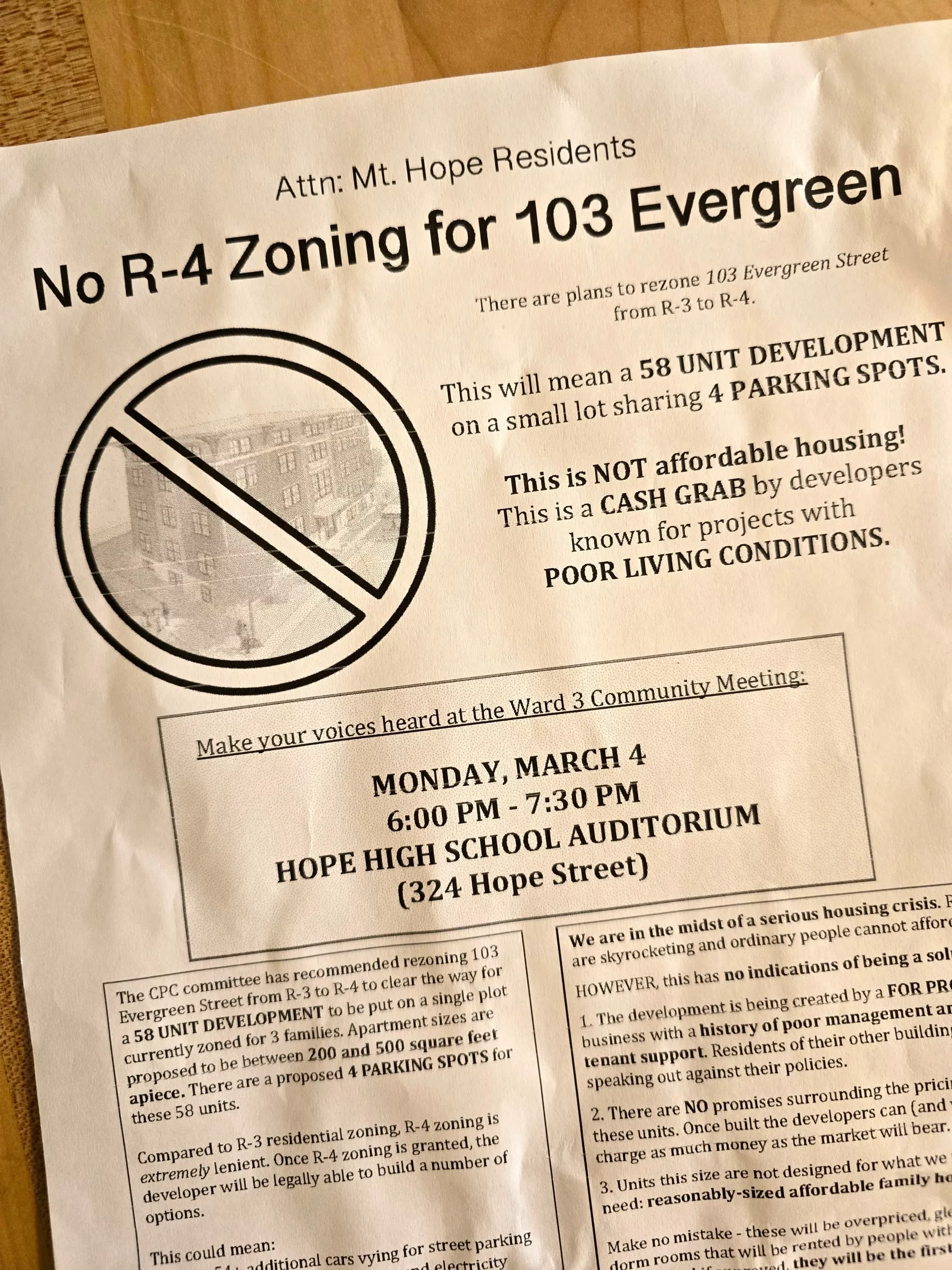NIMBYs overwhelmed yet another meeting, this time when 45 apartment units are being proposed on Providence’s east side’s Evergreen Street. It should come as no surprise, however, as in recent times, this same community has been firmly against other housing initiatives, including community development projects.
Opposition was strong, even leveraging an organized campaign behind it. Many residents received flyers on their doors urging them to contact their representatives prior to Monday’s local Council meeting. The flyer presented several arguments against the proposal and contained links to a website and a petition. All of this seemed to have borne fruit; the meeting was packed with resistance, bolstered by statements made by representatives in attendance.
Under examination, the flyer contained problematic reasoning throughout, and this extended to oppositional statements made during the meeting. Put simply, much of the thinking is rooted in classist, racist, and detrimental sentiments. Needless to say, we support this proposal and believe everyone else should if they believe we’re in a housing crisis.
What the opposition ultimately wants is a pipe dream that pretends the housing emergency doesn’t exist. They envision a large 2-3 family home with an oversized parking lot, where developers are building it with the sole purpose of communal benefit, and rents are low. None of this is sustainable. Not only does it forgo basic economics, but it also doesn’t address modern housing needs, nor the car-alternative infrastructure we equally desperately require. Even if this NIMBY ideal were constructed, they’d almost certainly find a way to complain and attempt to shut it down regardless.
No housing will ever be perfect, and in an ever-growing city, dense housing is vital. We must acknowledge that things change, and they should if we want to embrace growth. It’s also imperative that our leaders lead us in the right direction. In summary, we cannot let ourselves get dragged down by NIMBYism-based arguments.
Accordingly, I’ve put together a list of claims made by the opposition, accompanied by our own rebuttals.
Claims & Rebuttals
“This plot is currently zoned for 3 families.“
That’s the problem. Zoning is one of the main contributors to the housing crisis. The solution would be to change the zoning to accommodate more housing units, i.e., this proposal.
“Apartment sizes are proposed to be between 200 and 500 square feet.“
The developer recently downsized the number of units from 58 to 45, expanding overall sizes. Nonetheless, this type of micro-based housing is being used extensively globally to combat the housing crisis effectively. It’s generally enough space to have a roof over your head and have the essentials at more affordable rents. Most importantly, this type of housing is incredibly important to lower-income individuals, first-time renters, students, those recently homeless, and more.
“There are 4 parking spots for these units.“
Providence already suffers from an overabundance of parking and car reliance. This should instead be all the more reason to further our public transit and bike lanes–which many residential NIMBYs have previously opposed.
“54+ additional cars vying for street parking.“
In a dense city, no one requires a car. Those living in these dwellings are likely to be lower-income anyway and may be more reliant on non-car infrastructure to get around.
“A strain on water, sewer, and electricity.“
More housing does that, and notably, it’s what our taxes pay for. More people, more tax money. The ball is in the city’s court to manage that.
“Developers buying other houses to create similarly overpriced apartments.“
That’s capitalism. This isn’t a special case either; most landlords and developers already do this. It’s up to lawmakers to create regulations to encourage lower rents.
“The development is being created by a for-profit business with a history of poor management and tenant support.“
We are not aware of any developers building housing for the sake of goodwill, nor have we noticed many property owners on the “good management” side either. It’s up to lawmakers to ensure they create livable, healthy spaces for their tenants.
“There are no promises surrounding the pricing of these units.“
All housing is dictated by the market. If a cap or limit is required, it’s best to contact your representative to propose legislation around it.
“Units this size are not designed for what we really need: reasonably sized, affordable family housing.“
What we really need is dense housing. Even as the developer downsized the number of units and proposed multi-bedroom units, residents still spoke out. Really, what does the opposition actually want here?
“Make no mistake – these will be overpriced, glorified dorm rooms that will be rented by people with no other option.“
First off, this is outright poor shaming. Secondly, what other option is there for people? Homelessness?
“I think sometimes it’s easy to think about it in terms of jobs. Like when people say we want to create so many jobs, what we want to create are good, family-sustaining jobs, not just a million jobs at Walmart.” – Councilwoman Sue Anderbois (source)
These are not comparable and ignore the reality we live in. We are in a housing emergency. We don’t have years to wait; people are living on the street right now, and most are dedicating substantial amounts of their paychecks to rent. Additionally, these units are more than sufficient, being developed across the world, and would further accommodate lower-income individuals and families.
“They [the opposition] are concerned that the only people who will move into these micro apartments will be students without ties to the neighborhood. And that will further displace the families with deep and generational ties to the neighborhood.” – Representative Rebecca Kislak (source)
Students deserve housing as much as anyone else. More importantly, by implying that you should build larger, more expensive apartments, you’ve not just limited students; you’ve erected a barrier for everyone else. Displacement is furthered if we don’t go through with this affordable housing; in fact, continuing to put together big apartments progresses gentrification and encourages wealthier individuals to move in.
“The common thread that we do here is that…People are telling us that they really like the buildings. They just don’t want it in ‘choose the location where you live by.’ So, I think reconciling…If people really want housing, where do we build it?” – Dustin Dezube, one of the developers
source

